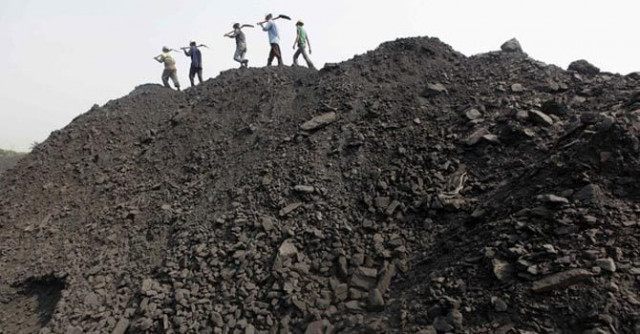Network to under-sell: The mine in minerals
‘Joint venture’ mafia underselling precious mines for cuts and commissions

The mining industry is known to have three basic
requirements; massive investment, competent human resource, and
fool-proof security to the life and property of persons involved. PHOTO: REUTERS
A joint team of intelligence experts is currently probing allegations that the mine-bureaucracy in Balochistan has been engaged in under-the-table deals.
Its members, in connivance with certain foreign investors, created a network to under-sell Pakistani mines for cuts and commissions.
While the team of experts gets to the bottom of the entire affair, symptoms of a ‘joint-venture’ mafia in the departments of mines are there in all four provinces.
The modus operandi is simple: create a committee of officials of the department to designate a potential site of gold, silver, copper, coal or iron ore and hold it until an investor or a group of investors come along to offer cuts and commissions to committee’s members for a ‘joint venture’.
This racket prevents timely leasing of mineral sites, but no authority is assigned to detect such illegal leasing with questionable titles to explore and exploit the country’s assets.
Observers unfamiliar with the situation suggest that investors are reluctant to come to Pakistan.
The truth is that mines offer phenomenal profits to potential investors, though they are occasionally deterred by the law and order situation.
They do not waste time in grabbing an opportunity if they see fair-play in leasing and title award.
However, the joint-venture mafia has lately created a business for investors in which only the department’s officials thrive, not Pakistan.
Businessmen and technical operators in the field of Pakistani mining indicate that the mafia in the bureaucracy denies leasing to potential investors without a ‘joint venture’ with their ‘committees’.
They make no secret of the fact that Pakistan has a wealth of minerals that, if exploited timely and without bureaucratic snags, might help generate revenues that could contribute significantly toward multiplying the development budget of the country within a decade.
Thar in Sindh has an estimated 175 billion tons of high quality coal identified in 1991 - the 7th largest in the world.
Preliminary gasification has started with a test of generating electricity from this site.
The copper and gold reserves in Riqo Dik Chagai are the fifth largest in the world.
Iron reserves in Chiniot area are over a billion tons, while at Dilband in Mastung District Balochistan these reserves are 300 million tons.
One of the largest lead-zinc deposit is located at Khuzdar in Balochistan.
Apart from these high-value reserves, a sea of granite and marble awaits investors in various parts of the country.
Mineral exploration and exploitation in most parts of the country stays dormant on account of snags inherent in the system of governance at the mineral sector. These snags are created and manipulated by the mineral bureaucracy to make the dirty buck.
The mining industry is known to have three basic requirements: massive investment, competent human resource, and fool-proof security to the life and property of persons involved in investment and mining operations. Without such an environment and a legal framework of fair administrative function, it is impossible to attract investment and human resource for mining activities—foreign and local. Non-existence of mineral titles under a well-established law, a mechanism that should prevent the excessive arbitrary powers of the executive, is preventing consistent investment flows.
In the absence of such a mechanism, bureaucracy intimidates and extorts unprotected investors.
Talk to any CEO of a mining company and you hear multiple stories of the mining departments’ bureaucracy seeking phenomenal favours for allowing smooth operations at mineral sites.
The government has somehow been nudged up from its slumber and appears to think of providing a modern legal framework for the mining leases and titles.
Punjab Chief Minister Shahbaz Sharif (ruling a province where substantial mineral deposits have been located) spoke of taking steps in this connection in the last week of May.
This is the second substantive indication of the government getting serious about this sector after 2001, when the Musharraf regime ordered enforcement of National Mineral Policy 1995.
This policy was previously resisted by the provincial mineral departments as it prevented them from ganging up and taking advantage of loopholes in the laws governing mineral deposits. The Mines and Minerals Department was created in every province under this policy (NMP). The department officials framed the provincial Mining Concession Rules 2002, but these rules have been rendered ineffective. That is where the actual scandal originates.
Under the NMP, no executive of the new Department of Mines and Mineral Development could exercise the authority of an appellate court. But in the new mining concession rules the executives of the new department assumed the powers of appellate authority on their own.
Now, they punch an investor out of business if he appeals against an official seeking illegal favours or demanding bribes.
THE WRITER HAS WORKED WITH MAJOR NEWSPAPERS AND SPECIALISES IN ANALYSIS OF PUBLIC FINANCE AND GEO-ECONOMICS OF TERRORISM
Published in The Express Tribune, June 8th, 2015.
Like Business on Facebook, follow @TribuneBiz on Twitter to stay informed and join in the conversation.


1733130350-0/Untitled-design-(76)1733130350-0-208x130.webp)















COMMENTS
Comments are moderated and generally will be posted if they are on-topic and not abusive.
For more information, please see our Comments FAQ